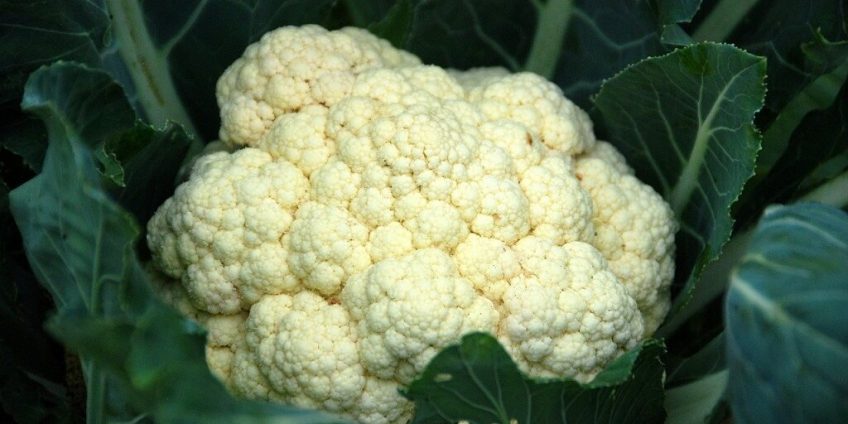Scroll to Recipes with Cauliflower / फूलगोभी as ingredient
Cauliflower is a vegetable feom the species Brassica oleracea. It belongs to the family Brassicaceae. The head or the white flesh part is only edible.
It is available in different color variations – White cauliflower is the most common one; however, Orange color is also available. It has a provitamin A pigment beta-carotene, which causes the color. Green cauliflower is similar to the white one.
Commonly Known as
| Language | Name | Written as |
|---|---|---|
| Hindi | Phulagobhi | फूलगोभी |
| Arabic | qarnabit | قرنبيط |
| Bengali | Phulakapi | ফুলকপি |
| Gujarati | Phūlakōbī | ફૂલકોબી |
| Kannada | Hūkōsu | ಹೂಕೋಸು |
| Malayalam | kēāḷiphlavar | കോളിഫ്ലവർ |
| Marathi | Phulakōbī | फुलकोबी |
| Punjabi | Phula gōbhī | ਫੁੱਲ ਗੋਭੀ |
| Tamil | Kāliḥpiḷavar | காலிஃபிளவர் |
| Telugu | Kālīphlavar | కాలీఫ్లవర్ |
| Urdu | gobhee | گوبھی |
Nutritional Profile of Cauliflower
Nutritional profile per 100 gms
- Calories: 25
- Protein: 1.9g
- Carbohydrate: 5g
- Fiber: 2g
- Fat: 300mg
- Sodium: 30mg
- Potassium: 299mg
Source: USDA & Google
Benefits
Prevents Cancer
Sulforaphane is a compound that kills cancer cells. This compound is found majorly in cauliflower. Hence, it is excellent for fighting lung cancer, bladder cancer, breast cancer. Prostate cancer, ovarian cancer, and cervical cancer can also be prevented.
Heart Health
Sulforaphane helps in increasing blood pressure and also kidney function. It is essential for normal cellular function and proper gene expression also. Thus cauliflowers are excellent for heart health because of this compound.
Antioxidant
This vegetable contains phytochemicals which stimulate cancer-blocking enzymes. They also protect the body cells from oxidative stress. Hence, it is an excellent antioxidant. And it will be beneficial to include in your diet.
Helps with Respiratory Problems
This vegetable helps to aid Respiratory papillomatosis, which is harmful by affecting the vocal cords in the larynx, trachea, lungs, and bronchi. Because it contains indole-3-carbinol, that is the reason for this to happen.
Bone Health
Cauliflower has Vitamin C and also K in significant amounts. And both of the vitamins help with the loss and strength of bones. Hence, including it in your diet is beneficial for your bone health.
Side Effects
There are few side effects regarding eating cauliflower. It contains complex carbohydrates that are hard to break. They are fed upon intestinal bacteria and release odorous gases. Excessive eating of this vegetable may cause uric acid as it contains purine. It can also lead to kidney stones and gout.
Frequently Asked Questions
Can one have cauliflower in a Keto diet?
Yes. one can consume cauliflower while on the Keto diet. However, the quantity one can have varied, so it is better to consult a nutritionist once to understand its quantity for the keto diet.
Which is more healthy, cauliflower or broccoli?
Broccoli has more calories and folate compared to cauliflower. Moreover, cauliflower doesn’t contain vitamin A, and the content of vitamin K and C is comparatively lower than broccoli. Depending on what nutritions one wants and what recipe one enjoys should decide what one prefers eating. There is no general one better than the other in every aspect.
Can cauliflower be bad for you?
The biggest issue cauliflower has a gastrointestinal problem. So it is not causing any graving issue. Not serious issues, but still uncomfortable.
Can we eat cauliflower raw?
Yes we can eat it raw with some dip. However, it is not advisable to eat it raw because it can take a long time to digest and cause stomache. However, it is better to saute or deep fry it before eating.

